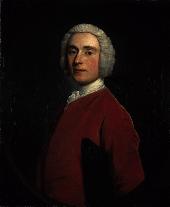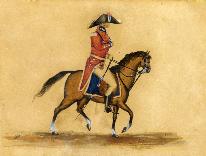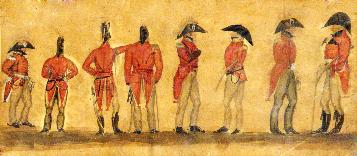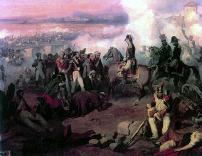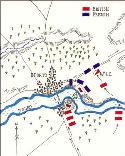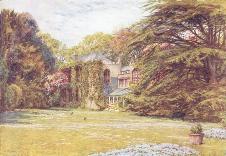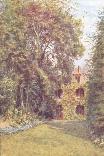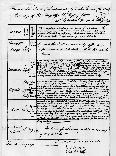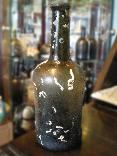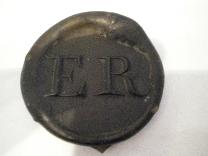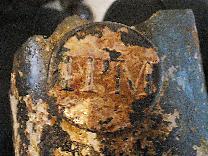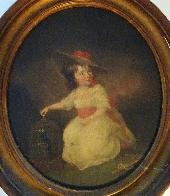Mary UNK (1724?-1797)
1. Mary UNK was born in 1724 (calculated). She made a will on 15 May 1794. She died on 13 March 1797 in Hastings. She married Abraham WHITHAM.
Mary was apparently receiving a £150 widow's pension in her last years. In her will she is described as "widow of the town of Hastings", living at her son-in-law's residence of Beauport Park.
"This is the last Will and Testament of me Mary Whitham widow of the town and port of hastings in the County of Sussex. I give and bequeath unto my son Abraham Whitham one Guinea for the purchase of a ring and I have unto my daughter Ann Murray the like sum of one Guinea for the purchase of a ring as a trifling memorial well knowing that they are both provided for and will not wish to partake of the little I may have to ?? unto my other two daughters a? ?? wish that both of my beloved grand children Cordelia Murray, James Murray, Williamina Murray and Ann Harriet Murray may both of them have a ring as a trifling memorial of my affection for them and all the rest residue and remainder of what I shall Siv? possessed of I give and bequeath unto my two daughters Mary and Susan Whitham jointly to be divided between them share and share alike and I do constitute and appoint my said daughter Mary Whitham sole executrix of this my will and to revoke all former will or wills by me made and do declare this only to be my last in testimony whereof I do hereinto set my hand and seal this fifteenth day of May in the year of our Lord one thousand seven hundred and ninety four - Mary Whitham - signed sealed published and declared by the said Mary Whitham in the presence of us? who in the presence of ? other and in her presence have hereinto one? ?? our names as witnesses - Winifred ?? Lames? D?utton - Sn. Knight.
This will was proved at London, the sixteenth day of September in the year of our Lord one thousand seven hundred and nenety seven before the worshipful Samuel Duarte? parson Turton of Laws? surrogate of the Right honourable Sir William Wynne Knight also Doctor of ?? Master Keeper or Commisary of the prorogative court of Canterbury lawfully constituted by the oath of Mary Whitham spinster the daughter of the deceased and the sole executrix named in the said will to whom administration of all and singular the goods chattels and credits of the said deceased was granted having both first sworn duly to administer".
To the memory of Mary Whitham Widow of the late Abraham Whitham Esq His Britannic Majestys Consul in the Island of Majorca Who departed this life at Hastings March 13th 1797 aged 73 years. Her remains are deposited in this church with those of Hugh William Whitham their youngest son who died July 26th 1785 aged 23 years also of Mary Whitham their second daughter who died March 2nd 1825 aged 75 years and of Susanna Whitham their third daughter who died March 5th 1830 aged 76 years.
Colonel Abraham WHITHAM was a Consul General of Majorca. He appeared in the census. He died before 1797. He and Mary UNK had the following children:
| +2 | |
| +3 | |
| +4 | |
| +5 | |
| +6 |
Second Generation
2. Mary WHITHAM, daughter of Colonel Abraham WHITHAM and Mary UNK, was born in 1750 (calculated). She died on 2 March 1825.
It is assumed that she died unmarried without issue, as she was still with the surname Whitham. Mary was the second daughter.
3. Susan(nah) WHITHAM, daughter of Colonel Abraham WHITHAM and Mary UNK, was born in 1754 (calculated). She died on 5 March 1830.
It is assumed that she died unmarried without issue, as she was still with the surname Whitham. She was the third daughter.
4. Ann WHITHAM, daughter of Colonel Abraham WHITHAM and Mary UNK, was born in 1761 (estimated) in Minorca. She married James Patrick 1 MURRAY on 14 March 1780 in Minorca. She died on 2 August 1824 in Berkley, Sussex.
In the family vault in this Church are deposited the remains of The
Honorable General James Murray/ (Late of Beauport in this County) Youngest son of Alexander fourth Lord Elibank of the Kingdom of Scotland. He departed this life at Beauport June 18th 1794 aged 75 years. Also of his second wife Anne daughter of Abraham Whitham Esq. She died August 2nd 1824 aged 63 years; also of two of their children, Elizabeth - Mary died April 8th 1785 aged 1 year and eight months and George died in February 1794 aged two months.
UNDERNEATH is a small rectangular white marble tablet :-
The above tablet was removed/ from the Old Parish Church by the/ Honorable General Murray's Grand-daughter Lady Troloppe wife of General Sir Charles roloppe,KCB/ November 1882.
General Sir James Patrick 1 MURRAY Governor of Canada, Warden of the Cinque Ports, Governor of Hull, son of Alexander MURRAY 4th Lord Elibank (1677-1735) and Elizabeth STIRLING (bef1683-1756), was born on [Julian] 21 January 1721 in Ballencrieff. He was a Governor General of Canada, General in the Army, Governor of Minorca, Governor of Hull, Warden of the Cinque Ports. He married Cordelia COLLIER in 1748 in London. He died on 18 June 1794 in Beauport, Hastings, Sussex. He and Ann WHITHAM had the following children:
| +7 | |
| +8 | |
| +9 | |
| +10 | |
| +11 | |
| +12 |
5. Hugh Williiam WHITHAM, son of Colonel Abraham WHITHAM and Mary UNK, was born in 1762 (calculated). He died on 26 July 1785.
He was the youngest son.
6. Abraham II WHITHAM, son of Colonel Abraham WHITHAM and Mary UNK, made a will on 10 January 1798. He died in 1805 (estimated).
It seems likely that he did not marry or have children, as his will seems only to mention his two unmarried sisters, Mary and Susannah.
Third Generation
7. Cordelia MURRAY, daughter of General Sir James Patrick 1 MURRAY Governor of Canada, Warden of the Cinque Ports, Governor of Hull and Ann WHITHAM, was born on 16 March 1781 in Mahon, Minorca. She married Henry HODGES on 25 April 1803 in Ore. She died on 1 May 1849.
Rev. Henry HODGES was a Clergyman. He died on 1 July 1837. He and Cordelia MURRAY had the following children:
| 13 | Henry HODGES (c. 1808-1870). Henry was born circa 1808 in Blackheath. He was a Rector of Alphamstone. He married Harriet Elizabeth MURRAY on 14 July 1834 in Benowen. He died on 1 September 1870. |
8. Major General James Patrick 2 MURRAY, son of General Sir James Patrick 1 MURRAY Governor of Canada, Warden of the Cinque Ports, Governor of Hull and Ann WHITHAM, was born on 21 January 1782 in Leghorn. He was a Major-General in the Army. He married Elizabeth RUSHWORTH on 31 January 1803 in Freshwater, Isle of Wight. He died on 5 December 1834 in Killenure House, near Athlone.
James Patrick Murray was the eldest son of the Hon. General James Murray. He was born in Leghorn Italy while his father was Lt. Governor of Minorca. The British Garrison on Minorca was under siege from French and Spanish forces and his mother, the former Ann Witham, was evacuated from the island to safety as she was expecting his imminent birth. Italy was the nearest friendly country.
Cordelia, General James' first wife, had died on 16th June 1779. Quite soon afterwards,1st June 1780, he married Ann Witham, a girl of only 19, who had just lost her father, (Abraham Witham, H.M.Consul to the Island of Majorca). General James Murray was 51 years old at the time. Their first child Cordelia, (JPM's elder sister) was born in Majorca on 16th March 1781.
French and Spanish forces began the siege of Majorca on 17 August 1781 and 2 days afterwards it was decided that Mrs Murray, her baby daughter and two other officers' wives would be evacuated. The account of her escape, as told by her granddaughter in 1877, is as follows: -
"My grandmother and the wives of the officers of his staff made their escape in an open boat in the midst of the night. Through the presence of mind of my grandmother, the boat was enabled to pass through the French and Spanish fleets, she repeating the parole in the Spanish language with calmness and being, like the other ladies, wrapped in a large military cloaks".
Although we know that General Murray did manage to maintain some sort of communication with Leghorn, Ann must have been a pretty cool young lady if, with the baby girl in her arms and another child on the way, she managed all this and a 500 miles sea journey from Minorca to Leghorn in an open sailing boat.
According to Lady O'Donnel's account "soon after they landed at Leghorn, she was taken ill and when the little boy was born he was apparently dead, but his mother entreated that he should immediately be put into a warm bath. She had dreamt that he was born dead and that thus, through the mercy of God, he was restored to life".
It seems that after they arrived in Leghorn they moved in fairly high class circles. JPM's godfather was the Grand Duke of Tuscany who was the son of the Emperor Francis I and Maria Theresa, and the brother of Marie Antoinette. The Grand Duke himself became Holy Roman Emperor as Leopold II in 1790.
JPM was probably brought up at Beauport, his father's estate in Sussex, but there is no record of his schooling. His father died when he was only 12 years old in 1794. On Gen. James's death, part of the Beauport Estate reverted to the Collier family and part sold to provide for his widow and daughters. Like his father JPM was destined for an army career and at the age of 14, in 1796, he was commissioned Ensign in the 44th Regiment .
In 1797 he was promoted lieutenant and was employed on regimental duty until 17th May 1780. He was then appointed ADC (Aide de Camp) to General George Don (Maria Murray's husband) with whom he served until June 1799. He then joined his relation Lieutenant General Sir James Pulteney Murray and served as his ADC during the campaign in North Holland.
The French had invaded and overrun Holland, renaming it the Republic of Batavia. It was in this war that the Dutch fleet, lying frozen in the Zuider See, was captured by French cavalry. In 1799, Pitt decided that unless Britain made some gesture and opened up a second front, the Austrians would make a separate peace with France. He therefore made a pact with Russia that a joint expedition should be launched against the low countries, Britain to supply 30,000 troops and Russia 16,000. To ensure success the Grand Old Duke of York was made commander in chief and his three divisional commanders were Abercrombie, Pulteney and Dundas. In spite of an unfavourable report by Abercrombie, it was decided that the expedition should land in the Helder area and drive south to Amsterdam. Landing in the Helder was not very difficult, but the Russian contingent soon proved unreliable and the British got bogged down amongst the dykes and canals. So an armistice was arranged whereby both sides agreed to exchange prisoners and Britain evacuated her army.
Although, as a lieutenant, JPM cannot have played in important part in this campaign he certainly took part in several actions and according to reports, General Pulteney enhanced his reputation by the resource and skill which he displayed. JPM saw active service on the 27th August, the 10th & 19th of September, and the 2nd & 6th October 1799. Clearly he did quite well as he was appointed Commanding Officer of a company in the 9th Regiment on the 26th December 1799.
The following year Pitt decided to send an expedition to Ferrol in northern Spain. Raids such as these had earlier been described as ' breaking windows with guineas. General Pulteney was put in command and landed on the 25th August 1800. On the next day General Pulteney, having surveyed the fortress, held a staff conference and advised that it was far too strong to be assaulted with any chance of success, so he re-embarked his men. For his conduct he was the subject of a motion of censure in the House of Commons, in which Pitt spoke against him, but to which he replied vigorously and was finally exonerated. Murray had again accompanied him on this abortive expedition as his ADC.
At the Peace of Amiens in 1802 JPM was placed on half pay .
It was about this time that he went to the Isle of Wight . Why he gave up his military career at this point is a little bit of a mystery. When the Peace of Amiens was signed in 1802 he was aged 20, had already had some six years military service and must have decided to abandon a military career and take up politics. He may have become disenchanted with the idea of a military career , having seen unsuccessful commanders arraigned before Parliament or courts martial for lack of success. Austria had made peace with France, Napoleon had won the battles of Marengo and Hohenlinden, the war had reached a stalemate and people had begun to get war weary . Perhaps there was a vacant parliamentary seat going cheap at Yarmouth. Perhaps Edward Rushworth fixed him up, encouraged marriage to his daughter Elizabeth and even gave her some land at Farringford Hill for the couple to build themselves a home. In any case he married Elizabeth Rushworth, the daughter of Edward Rushworth and granddaughter of Lord Holmes, and entered Parliament as MP for Yarmouth on the 8th July 1882 at a general election. His parliamentary career was extremely brief, however, for on the 25th February 1803 someone else was returned in his place. He had resigned his seat accepting the motion to assume the office of Steward of the manor of East Hendred. Between his election and his resignation the House only sat in the period 16th November to 29th December 1802 and from the 3rd February 1803. He was thus effectively a member for little more than seven weeks.
However war broke out almost immediately and JPM went off to the newly founded Royal Military College at High Wycombe (later moved to Sandhurst) and on 18th May 1803 was gazetted to a company in the 66th Foot (the Royal Berkshire Regiment). During the next six years the regiment were on garrison duty in Ireland and their various moves may be followed in the history of the Berkshire Regiment. In spite of the fact that the Act of Union had just been passed and that St Patrick's cross had been added to the Union Jack, that country was still unsettled. A few years earlier there had been two French landings and the National rising had been defeated at the battles of the New Ross and Vinegar Hill. Pitt tried to include Catholic emancipation as part of the terms of the Union, but George III had refused to sanction such a clause (which might later have saved much unrest and bloodshed) because he considered it contrary to his coronation oath.
While stationed in Ireland the Murrays had three children who survived, a daughter and two sons. They were privately baptised in Ireland and each later publicly christened at Freshwater Church in the Isle of Wight - so they moved fairly often between Ireland and England.
Whilst in Ireland the regiment had been alerted that they might be sent abroad and there was speculation as to whether it would be to the East Indies, to South America or Ceuta (see the letters sent by JPM to his wife during this period - they are rather sad in that Elizabeth was unable to see her husband despite being in (a different part of) Ireland herself at the time, very heavily pregnant and with no idea where JPM would be sent next or when she would next be able to see him; the situation was even more poignant in hindsight as he would shortly sustain the injury which altered the course of his whole career). Actually they landed in Portugal in April, about the same time as Arthur Wellesley and on the 12th May 1809 they played an important part in the passage of the river Douro (see separate account of this).
Marshall Sault had entrenched himself on the north bank of a broad river in the town of Oporto and had kept a strong reinforcements on his right wing for fear Wellesley might attempt a landing by sea in his rear. Wellesley found some unguarded wine barges and a scuttled ferry boat upstream and, round a bend of the river, out of sight of the French, pushed over 30 men of the Buffs, who immediately occupied a convent. The Berkshire Regiment under Murray were then sent over to reinforce them. During this diversion the townsfolk in Oporto started to riot at and the Worcesters and the Guards crossed the river. The French retreated in confusion leaving behind their artillery and stores.
It was during the fierce fighting to retake the convent that JPM received the severe wound which ever after impaired his health and deprived him of the use of his right arm. According to his daughter, "his right elbow was shattered in the battle, the arm was on the point of being amputated, when Sir Arthur Wellesley came into the hospital and stopped the operation. However the arm was always useless". According to the official records of the Berkshire Regiment in the glorious fight at the seminary the 66th lost Major Murray and Captain Benning, both seriously wounded. The brigade was thanked on the spot by the Commander in Chief himself. In 1814 the Regiment received the battle honour 'Douro' for this action.
On the 25th May 1809 JPM was promoted Lieutenant-Colonel and subsequently employed in the Quarter Master General's Department in Ireland. On the 2nd November 1809 he was appointed Lieutenant-Colonel of the 5th garrison Battalion. From 1811 to 1819 he was assistant Adjutant General in Ireland and stationed at Athlone and on the 12th August 1819 he received the brevity of Colonel .On the 22 July 1830, he was promoted to Major-General, and was created a Companion of the Bath on the first creation of that class of order.
He died in Ireland at his home Killenure House, near Athlone after a few days' illness, in his 53rd year "greatly lamented by his family, and sincerely regretted by his relatives and friends " . An Irish newspaper describes the accident leading to his death as follows: "....the circumstances attendant upon the death of General Murray are rather of a tragic nature and afford a convincing proof of the finest feelings of human nature and the most humane and sympathetic dispositions are merely allied to or associated with courage and native bravery. He caught cold from his exertions in endeavouring to recover the bodies of two fellow officers who met with a watery grave on their way back to their barracks from his house".
JPM and Elizabeth had six sons and six daughters.
Elizabeth Murray, nee Rushworth, survived until 15th November 1865, when she died at Rossanna House, and was buried in Benowen churchyard. She was descended from two important families in the Isle of Wight. Records of the members of Parliament for Yarmouth, which was a pocket borough, show that you had either to be a Holmes, a Rushworth or a Jervoise! Elizabeth's mother Catherine, born in 1725, was the daughter of the 2nd Lord Holmes, whose family name was Troughear. The story starts with a gentleman who began life under the name of the Reverend Leonard Troughear. By 1763 this fellow was thoroughly involved in local politics and borough-mongering as Sir Leonard Troughear Worsley Holmes (having taken his mother's maiden name). In 1797 he became Lord Kilmalloch in the county of Limerick and he died in 1804. When his daughter Catherine (1765 - 1829) married Edward Rushworth at the tender age of 15 he gave her some land in the neighbourhood of Freshwater. Thereafter Edward Rushworth seems to have been described as ''of Freshwater House'' (this was possibly on the site of what is now described as Manor Farm). In 1790 Edward Rushworth added to his property by purchasing various fields from a Mr William Bowman of Brook, a neighbouring hamlet not far from Farringford .
It seems that when Elizabeth Rushworth married JPM they were given land on which to build a house by her father Edward Rushworth. This house was called Farringford Hill. When JPM went to Ireland with his regiment they clearly left some bills behind, possibly for completing the house. Edward Rushworth wrote to Thomas Sewell of Newport, Isle of Wight, as follows: "I am greatly hurt by receipt of your letter respecting the taxation of costs. I have repeatedly written to Murray on the subject and his answers were not at all satisfactory. I shall again write to Col. Murray and press the subject very warmly, adding that if he does not think proper to pay the costs, I shall make the satisfaction from my own purse, which has already undergone privations". The story is confirmed by Lizzie Harvey ( JPM's granddaughter) who stated in a letter that her grandfather began building Farringford "which was considered very foolish of him owing to his financial circumstances". She maintained that Elizabeth's father took the building off his hands and finished it. She also believed they had a lawsuit. Farringford Hill was sold on Edward Rushworth's death to a family called Middleton, who probably later sold it to Alfred, Lord Tennyson. Lord Tennyson later extended the house and renamed it Farringford House .
It is unlikely that James Patrick Murray took part in the festivities following the armiy's success at Douro. His arm had been completely shattered. In fact, it was on the point of being amputated when the Duke of Wellington interceded and demanded the arm be saved. However, it was thenceforth completely useless, and Murray always had to carry it in a sling, as the portraits of him by Sir George Don show.
Some of Murray's letters to his wife Elizabeth, who was from a well-known family in the Isle of Wight, survive. They date from just before and just after the passage of the Douro, and acquire a particular poignancy given the injuries that were inflicted on Murray in that battle: immediately before the regiment was sent to Portugal, Murray had no idea where or when they would next be sent. Elizabeth ("Betsy") was then staying fifty or so miles away in Limerick, and is most anxious to see her husband. He replies with great affection, but rejects the possibility as impractical, since she might arrive, after a substantial journey, only to find that the regiment has just left or is about to leave; then, they would be in a worse situation than now, he says. The letters give a lot of detail about the speculation which was rife in the regiment about where they will next be posted, and give an insight into how insecure the world of a military officer was, especially in those days of colonial expansion, where the army was deployed all over the world - for example: "...your surmise respecting the battalion on a draft going to the West Indies is not correct, as you will see in the letter which I wrote to you yesterday, that we do not pack our heavy baggage, we are to go in the lightest possible order and camp equipage is to be delivered to us today; I am convinced we are going either to Cadiz or Cueta - General Sherbrooke's expedition is driven into Cork entirely and an officer of the 88th, Mr McCarthy, who belongs to it, came on shore this morning to see his brother, who is in this regiment. He says that the orders were yesterday that we are to join that expedition...", and so it goes on. Then, a few days later: "I have nothing new since last night, we are all in the same uncertainty, the report is now that we are not to join Shellbrooke's expedition, but that they are to sail immediately and that we are to go as was first mentioned under Beresford, one report is to Cueta, and the other is to South America, the former destination I believe to be the true one, as if we were destined for South America we should receive more than two months pay in advance...."
Clearly, though, the couple are very much in love and missing each other. It is particularly touching that they are so close, relatively, and yet unable to be together, considering that he is to get a posting abroad in the near future. Murray's letters finish with real outpourings of feeling: "I must now, my ever dearest Betsy, conclude. God Almighty bless, preserve and protect you, my dear Catherine, James and little Pulteney, and kiss them all a thousand thousand times for me and believe me to be ever your most sincerely and truly affectionate husband". Sometimes he refers to his second son as "pretty Pulteney": it is interesting to note that, unlike his father and grandfather, and unlike his son and grandson, "pretty Pulteney" did not have a successful career in the army: maybe he was a little too pampered.
On the subject of James Patrick's 12 children, it is extraordinary that he got the time and opportunity to be so fecund, given the amount of time he spent away from home!
James Patrick's last surviving letter is after Douro, when he was still suffering badly from his shattered arm. The letter in full goes: "Thank God I am safely arrived in the Island - I landed at Ryde this morning and have suffered so much both in the boat and the hack chaise, that I find it impossible to come on to Farringford this afternoon- so much as I wish it. I beg therefore you will request Mr Rushworth to let you have the carriage to come over and we will return with you tomorrow. Do pray come - Sir H. and Lady Holmes are both extremely kind and request you will come - I cannot write more; God bless you all, remember me most affectionately to Mr and Mrs Rushworth and all, and believe me...".
Obituary in the Gentleman's Magazine June 1835
MAJOR-GEN.. J. P. MURRAY, C.B.
Dec. 5. At Killeneure, near Athlone,
In his 53d year, Major-General James
Patrick Murray, C.B.
This gallant officer was the only son of General time Hon. James Murray, (fifth Son of Alexander fourth Lord Elibank,) distinguished by his persevering defence of Minorca in the years 1781.82. It was at that period that the subject of this notice was born, on the 21st Jan. 1782, at Leghorn, to which city his mother had retired from the siege. She was Anne daughter of Abraham Whitham, esq. the British Consul-general at Majorca. He was educated at Westminster School; and, having determined to follow his father's profession, obtained an Ensigncy in the 44th regiment in 1796, and in the following year was promoted to a Lieutenancy in the same corps. In May 1798 he was appointed Aid-de-camp to General Don, with whom he continued in the Isle of Wight until June 1799; when he joined his relation and guardian Lt.Gen. Sir James Pulteney, and served as Aid-de-camp to that officer during the campaign in North Holland. He was present in the actions of 27 August, 10 and 18th Sept. 2nd and 6th Oct. and was in one of them slightly wounded. On Dec. 26, 1799, he was gazetted to a company, by purchase, In the 9th foot. He next accompanied Sir James Pulteney to the Ferrol, and was intrusted, by both the General and the Admiral in that expedition, with some important and confidential transactions. At the general election of 1802 he was returned to Parliament as one of the Members for Yarmouth in the Isle of Wight; but vacated his seat in the following March. At the peace of Amiens he was placed on half pay; and after studying for some time at the Royal Military Academy, was re-appointed to half pay in the 66th foot. In 1803 he espoused the amiable object of a long attachment, Elizabeth, eldest daughter of Edward Rushworth, esq. of Freshwater House, Isle of Wight, and granddaughter of the late Lord Holmes, by whom he has left twelve children. In Feb. 1804, he obtained by purchase, a Majority in the 66th, with which he was stationed in several parts of Ireland; and subsequently was appointed to the staff of that country as Assistant Quartermaster-genera1 at Limerick, which situation he relinquished in order to accompany his regiment on foreign service. With the same regiment he also served in Portugal; where, at the passage of the Douro, he received a severe musket wound, which not only completely shattered and deprived him of the use of his right arm, but ever after impaired his general health. His gallant conduct, on this occasion, is honourably recorded in the public despatch of Sir Arthur Wellesley, who, shortly after he had received the shot, came up to him on the field, and, taking him by the hand, said, -" Murray, you and your men have behaved like lions; I shall never forget you". On the 25th May 1809, Major Murray was promoted to the rank of Lieut. - Colonel; and on his return home, he was employed in the Quartermaster-general's department in Ireland. From 1811 to 1819 he was Assistant Adjutant-general, stationed at Athlone. In 1819 he received the brevet of Colonel, and in 1830 that of Major General.
His death was occasioned by a cold caught in his humane exertions to save the lives of two young officers, who were drowned in the lake in front of his residence (see p. 220). He possessed an accomplished and a benevolent heart; and was characterized by the highest honour, integrity, and worth.
P220 - Drowned by the upsetting of a boat on the Upper Shannon, near Athione, Ensigns James R. Byers and Win. J. Kerr, (see p. 110), both of 1st regt.
Elizabeth RUSHWORTH, daughter of Edward RUSHWORTH (1755-1817) and Hon. Catharine HOLMES (1765-1829), was born on 15 October 1783. She died on 15 November 1865 in Benowen, Ireland. She and James Patrick 2 MURRAY had the following children:
| 14 | Catherine Anne MURRAY (1804-1895). Catherine was born on 21 September 1804 in Banagher, Ireland. She was baptised in Freshwater Church. She married Charles Routledge O'DONNELL on 4 September 1846. She died on 26 February 1895 in Kingstown, Ireland. |
| 15 | James Edward Ferguson MURRAY (1806-1834). James was born on 19 April 1806 in Clonmell, Tipperary, Ireland. He was a Lieutenant in the Navy. He married Katherine Jane SLAUGHTER on 15 December 1830 in Sandwich, Kent, England. He died on 17 July 1834 in Athlone, Ireland. |
| 16 | Pulteney MURRAY (1807-1875). Pulteney was born on 9 July 1807 in Galway, Ireland. He was born in 1807 in Perth. He was baptised on 20 December 1809 in Freshwater Church. He was a Major in the Army + Sub Inspector of the Royal Irish Constabulary. He had 1 child. He married Jane MACKENNY on 23 May 1848. He died on 20 September 1875 in Galway. |
| 17 | Harriet Elizabeth MURRAY (1809-1882). Harriet was born on 6 April 1809 in Co. Cork, Ireland. She was baptised on 20 December 1809 in Freshwater Church. She married Henry HODGES on 14 July 1834 in Benowen. She died on 29 June 1882. |
| 18 | Mary Johanna MURRAY (1810-1875). Mary was born on 5 January 1810 in Merrion, Dublin. She married Andrew NEWTON on 14 July 1834 in Benowen. She married William Francis HARVEY on 13 February 1849. She died on 31 March 1875 in Purbrook. |
| 19 | Jane Susan MURRAY (1810-1841). Jane was born on 13 October 1810 in Athlone. She died on 3 August 1841 in Benowen. |
| 20 | Charles MURRAY (1814-1848). Charles was born on 30 December 1814 in Athlone. He was a Soldier. He married Anne Mitchell SCOTT on 12 October 1844. He died on 6 April 1848 in West Indies. |
| 21 | Elizabeth MURRAY (1817-1904). Elizabeth was born on 6 February 1817 in Athlone. She died on 10 December 1904. |
| 22 | Henry Patrick MURRAY (1819-1855). Henry was born on 19 February 1819 in Athlone. He died on 29 June 1855 in Benowen. |
| 23 | Cordelia Maria MURRAY (1822-1909). Cordelia was born on 27 February 1822 in Westmeath, Ireland. She married Charles TROLLOPPE on 30 March 1864 in St. George, Hanover Square. She married Edmond BOWER in 1892. She died on 3 December 1909. |
| 24 | Douglas Alexander MURRAY (1824-1866). Douglas was born on 2 January 1824 in Killinure House, Westmeath, Ireland. He married Mary Anne MURPHY on 10 November 1848 in St. Louis, Missouri. He married Mary Ann BELTZHOOVER on 8 November 1855 in (First Evangelical Lutheran Church) Carlyle, Pennsylvania. He died on 19 July 1866 in Washington DC. He was buried in Carlyle, Pennsylvania. |
| 25 | George Don MURRAY (1826-1857). George was born on 10 March 1826 in Westmeath. He was a Sailor. He died on 12 August 1857 in Athlone. |
9. Elizabeth Mary MURRAY, daughter of General Sir James Patrick 1 MURRAY Governor of Canada, Warden of the Cinque Ports, Governor of Hull and Ann WHITHAM, was born on 8 November 1783 in Beauport, Hastings, Sussex. She died on 8 April 1785 in Beauport.
10. Wilhelmina MURRAY, daughter of General Sir James Patrick 1 MURRAY Governor of Canada, Warden of the Cinque Ports, Governor of Hull and Ann WHITHAM, was born on 14 January 1787 in Beauport. She married James DOUGLAS on 18 May 1813. She died on 25 February 1866.
Rev'd James DOUGLAS, son of Archibald James Edward DOUGLAS 1st Baron Douglas of Douglas ( - ) and Lady Frances SCOTT ( - ), was born on 9 July 1787. He was baptised on 6 August 1787 in Petersham, Surrey. He had the title '4th Baron Douglas of Douglas'. He died on 6 April 1857 in Bothwell Castle, Lanarkshire, Scotland. He was buried in Douglas, Scotland.
11. Anne Harriet MURRAY, daughter of General Sir James Patrick 1 MURRAY Governor of Canada, Warden of the Cinque Ports, Governor of Hull and Ann WHITHAM, was born on 10 August 1788 in Beauport. She died on 13 November 1850.
12. George MURRAY, son of General Sir James Patrick 1 MURRAY Governor of Canada, Warden of the Cinque Ports, Governor of Hull and Ann WHITHAM, was born on 1 February 1794. He died in February 1794.
